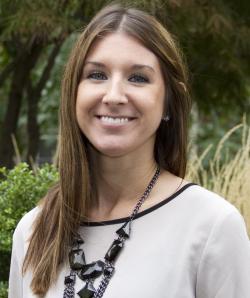Analysis from the school’s Partnership for Evaluation, Research and Implementation aims to assist HFLA of Northeast Ohio in enhancing lending practices
When HFLA of Northeast Ohio began providing interest-free loans to low- to moderate-income residents almost 120 years ago, the lending institution didn’t have data to determine how to improve its services.
HFLA now has plenty—including trends in loan defaults and what factors affect a borrower’s ability to repay loans. With help from the Partnership for Evaluation, Research and Implementation (PERI), the lender is looking to make sense of the data to better serve customers.
Housed in the Begun Center for Violence Prevention and Research at Case Western Reserve University’s Jack, Joseph and Morton Mandel School of Applied Social Sciences, PERI offers evaluation services and support to local nonprofits. Through funding provided to PERI from The George Gund Foundation, agencies selected to work with PERI pay only a fraction of project costs, with the remainder provided by the Begun Center and participating foundations. In the past six years, PERI has evaluated and advised 13 local nonprofits in health and human services, ranging from Believe in Dreams to Fostering Hope.
HFLA of Northeast Ohio was one of two clients PERI chose to work with for this round of projects.
Ashley Bukach, assistant director of PERI, said nonprofit agencies like HFLA of Northeast Ohio want to continuously improve their services, which, in turn, helps the community. But they often lack staff, time and resources or the expertise to evaluate themselves effectively.

“I think one of the things I enjoy most about these projects is that we’re helping agencies who serve a vulnerable population—agencies that provide really critical and practical services in the community,” she said. “Not because we really enjoy working with numbers, but because we understand that data can help these organizations serve the community better.”
Bukach said PERI’s first step with HFLA is to calculate repayment rates of loans provided to residents who lack access to traditional capital. The loans help pay for such needs as student tuitions or business development.
“Identifying default trends in the past will provide HFLA with insights into how to better support clients and increase their likelihood for successful repayment in the future—a win-win for clients and the organization,” she said.
Carrie Miller, acting director of HFLA, said her agency has collected detailed information over the past several years, but this is the first time the organization is taking a “deep dive” into the data. HFLA plans to use the results of this PERI project to take “a data-informed approach” to develop new lending practices and improve data-management system to best serve clients, she said.

“Working with the team at PERI has given HFLA of Northeast Ohio an opportunity to ask questions about how we do our work and how we can do it better,” Miller said. “We have started looking at our data differently and finding new ways to tell our story to borrowers, partners and the greater community.”
Jeff Kretschmar, director of PERI and managing director of the Begun Center, said work with HFLA fits the Mandel School’s mission.
“PERI is about providing low-cost and quality evaluation services to organizations that normally wouldn’t be able to afford them,” he said. “HFLA is about providing loans to people who normally wouldn’t be able to afford them. They’re looking out for the community, and we’re looking out for them.”
For more information, please contact Colin McEwen at colin.mcewen@case.edu.


